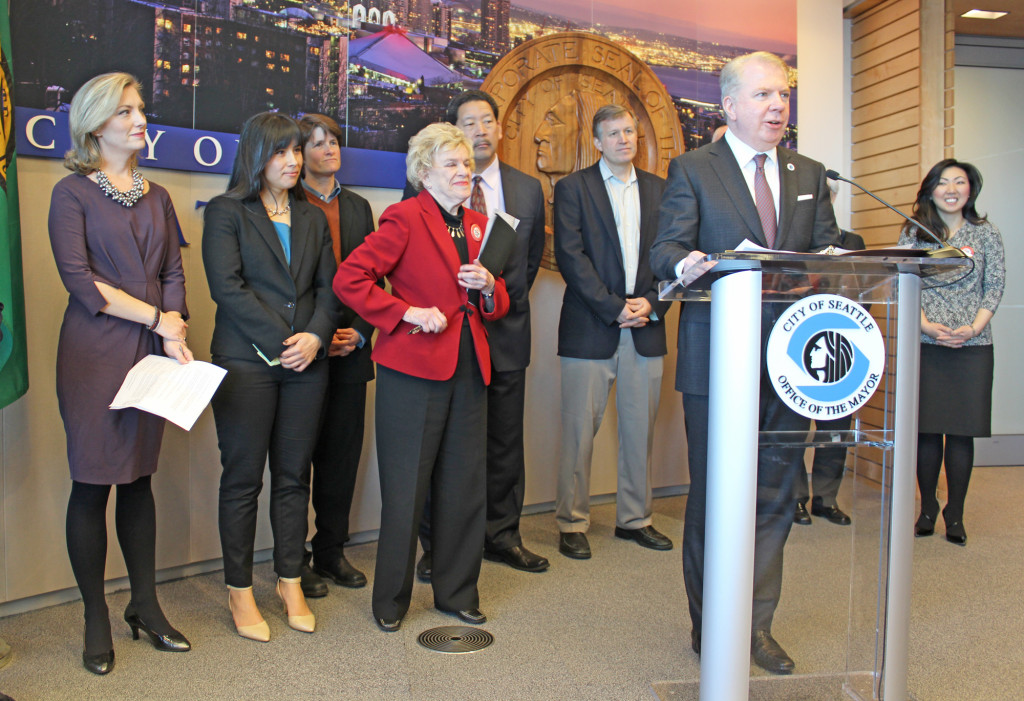Mayor Ed Murray and City Councilmember Jean Godden announced their plan on Monday February 23 to create a paid parental leave benefit for employees of the City of Seattle.
“We are the only country in the industrialized world, the only first world country, that doesn’t offer this benefit,” Mayor Murray said.
Councilmember Godden has championed gender equity issues since her time as a columnist at the Seattle Times in the 1990s. “Paid parental leave is good for our workers, good for our children and good for our economy,” said Godden. “It is an important step towards creating a workplace which supports all employees, especially women, and is fundamental to the gender equity policies that Seattle – and the nation – have long needed.”
The bill, if passed by the City Council, would grant city employees, regardless of gender, four weeks of continuous or intermittent paid leave per birth, adoption, or foster placement of a child into their family.
Currently, city employees can currently take up to 90 calendar days of unpaid leave in the 12 months after the birth of a child, using their earned vacation and sick leave through the Family Medical Leave Program. However, many workers end up taking unpaid leave. In 2011 and 2012, women employed by the City of Seattle took an average of 18 weeks of leave with the birth or adoption of a new child, with an average of eight weeks unpaid.
The bill comes in response to recommendations developed by the Gender Equity in Pay Taskforce, which was created in 2013 to address inequities in salaries and wages based on gender in Seattle City government. Among the comprehensive list of recommendations aimed at fixing the City’s gender pay gap and the root causes of gender inequity: expand employee benefits and create a culture that supports families. That laid the groundwork for Murray’s proposed parental leave program.
Paid parental leave goes a long way towards addressing gender inequity. When women can afford to stay home with their new babies, they are much more likely to return to work, which means they can continue contributing to their families. Returning to work also means protecting women’s earning potential over the long term.
Additionally, the non-gender specific language of the proposal means that fathers can also stay home with new babies, a growing trend in the United States. Of particular importance is the impact this will have on gay male parents, who have been left out of the traditional maternity leave policies.
Even though four weeks of paid time pales in comparison to other cities who have passed similar legislation (Austin, San Francisco, Chicago, and others), advancing paid parental leave is undeniably a step in the right direction – especially for Seattle. Two years ago, a study by the National Partnership for Women & Families found that the Seattle area had the largest wage gap between women and men among 50 major metropolitan areas in the U.S. The analysis found that full-time employed women in the Seattle area make just 73 cents for every dollar earned by men. It’s no surprise then, that Seattle leadership is choosing to address gender inequity.
Paid leave is only one aspect of economic security, but it is a crucial step towards advancing gender equity. Until all workers, regardless of where they work, can afford to care for a new baby, stay home when they’re sick, or take care of a sick or injured family member, we must keep pressing ahead.
By Sam Hatzenbeler, MPHc
More To Read
July 19, 2024
What do Washingtonians really think about taxes?
Most people understand that the rich need to pay their share
July 18, 2024
Protect Washington’s Kids by Protecting the Capital Gains Tax
Vote NO on I-2109 to keep funding for public education and childcare
July 15, 2024
It’s too expensive to get sick – it’s time to protect Washington patients
The extraordinary cost of medical debt.

